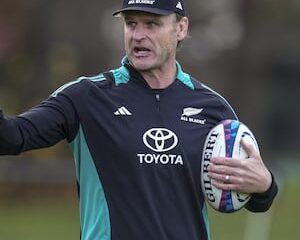Sports
All Blacks Face Tough Reality After Loss to England at Twickenham

The All Blacks experienced a disappointing 33-19 defeat against England at Twickenham, raising serious questions about the team’s progression under coach Scott Robertson. This loss marks a significant setback, especially considering their prior encounters with England last year, where they seemed competitive. The outcome signals that while England has clearly advanced, the All Blacks find themselves stagnant in a rapidly evolving international rugby landscape.
The atmosphere surrounding the match was charged with expectation, as both the English press and fans expressed confidence in their team’s performance. This optimism was not merely nationalistic pride but a reflection of England’s recent form, indicating a logical assessment rather than unfounded belief. In contrast, New Zealand is grappling with persistent issues. Two years away from the Rugby World Cup, the All Blacks are not showing the signs of improvement needed to compete at the highest level.
One of the critical problems lies in their performance after halftime. The team has frequently struggled to maintain momentum, often succumbing to avoidable penalties and exhibiting a lackluster kicking game when Cam Roigard is not on the field. Questions remain about the optimal players for key positions, including No 10, No 6, and No 14, which further complicates their strategy.
Despite some improvements, such as better competitiveness under the high ball against England, a new concern has emerged regarding the All Blacks’ scrum. This year, they have not shown significant advancement, suffering defeats to South Africa and struggling against England’s pressure in the second half.
Looking ahead, New Zealand is expected to secure a victory against Wales next weekend, concluding their campaign on a more positive note. Nevertheless, this should not overshadow the multitude of issues that continue to plague the team. Since Scott Robertson’s tenure began with a narrow 16-15 victory over England in Dunedin, his leadership now appears to be wavering between underwhelming and concerning.
When the official World Rugby rankings are updated on Monday, the All Blacks will remain in the second position, trailing behind South Africa. However, many observers believe that New Zealand’s true standing may be closer to third or fourth, with both England and a full-strength France capable of outperforming them.
The recent departure of assistant coach Jason Holland presents an opportunity for New Zealand Rugby to reassess its coaching structure. Robertson indicated before the grand slam tour that Holland might not be replaced, suggesting a potential shift in strategy. David Kirk, the chair of New Zealand Rugby, has been actively promoting the All Blacks as a premier team and brand. It is unlikely he will accept the current level of performance without significant changes.
For example, the decision to retain Leroy Carter, despite his poor form and a yellow card against Scotland, has raised eyebrows. His missed tackle against England’s Ollie Lawrence, resulting in a soft try, exemplifies the team’s ongoing struggles.
As the summer approaches, the All Blacks face a long period of reflection and potential restructuring. The coaching staff is under increasing pressure to address these issues and restore the team’s former glory. The path ahead will require tough decisions and a commitment to improvement if the All Blacks aim to compete successfully on the world stage.
-

 Sports2 months ago
Sports2 months agoNetball New Zealand Stands Down Dame Noeline Taurua for Series
-

 Entertainment2 months ago
Entertainment2 months agoTributes Pour In for Lachlan Rofe, Reality Star, Dead at 47
-

 Entertainment1 month ago
Entertainment1 month agoNew ‘Maverick’ Chaser Joins Beat the Chasers Season Finale
-

 Sports2 weeks ago
Sports2 weeks agoEli Katoa Rushed to Hospital After Sideline Incident During Match
-

 Sports2 months ago
Sports2 months agoSilver Ferns Legend Laura Langman Criticizes Team’s Attitude
-

 Politics1 month ago
Politics1 month agoNetball NZ Calls for Respect Amid Dame Taurua’s Standoff
-

 Sports2 weeks ago
Sports2 weeks agoJamie Melham Triumphs Over Husband Ben in Melbourne Cup Victory
-

 Entertainment3 months ago
Entertainment3 months agoKhloe Kardashian Embraces Innovative Stem Cell Therapy in Mexico
-

 World4 months ago
World4 months agoPolice Arrest Multiple Individuals During Funeral for Zain Taikato-Fox
-

 Sports3 months ago
Sports3 months agoGaël Monfils Set to Defend ASB Classic Title in January 2026
-

 Entertainment2 months ago
Entertainment2 months agoTyson Fury’s Daughter Venezuela Gets Engaged at Birthday Bash
-

 Sports2 months ago
Sports2 months agoHeather McMahan Steps Down as Ryder Cup Host After Controversy




















